News
US cites QRIS as trade barrier, but US payment model unfit for Indonesia
Tenggara Strategics May 3, 2025 A buyer pays his bill using Quick Response Indonesia Standard (QRIS) code at a street foodstall on Jl. Ampera Raya in South Jakarta on Feb. 6, 2021. Bank Indonesia estimated 12 million micro, small and medium enterprises (MSMEs) would shift to the cashles
A buyer pays his bill using Quick Response Indonesia Standard (QRIS) code at a street foodstall on Jl. Ampera Raya in South Jakarta on Feb. 6, 2021. Bank Indonesia estimated 12 million micro, small and medium enterprises (MSMEs) would shift to the cashles
Indonesia’s efforts to strengthen trade ties with the United States have hit an unexpected roadblock, centered on the country’s QR code-based payment system—Quick Response Indonesia Standard (QRIS). The U.S. government has classified QRIS as a trade barrier, arguing that it has curtailed the dominance of Visa and Mastercard in Indonesia’s payment ecosystem, where both companies had expanded prior to QRIS’s launch in 2019.
According to a report by the Office of the United States Trade Representative (USTR), QRIS was implemented without adequate international consultation, effectively sidelining foreign stakeholders. The claims international stakeholders were excluded from consultations and had no opportunity to weigh in on the policy. However, this claim is questionable. Visa, Mastercard, and Europay—all part of the global EMVCo consortium—are members of the Indonesian Payment System Association (ASPI), which was engaged throughout QRIS development. This undermines the U.S. assertion of a lack of international input.
At the heart of the dispute is not a lack of consultation, but in the operational structure of Indonesia’s National Payment Gateway (NPG), which prevents Visa and Mastercard from building their own local switching networks. This exclusion is not incidental; it is enshrined in Bank Indonesia Regulation No. 19/8/PBI/2017, which mandates that all domestic card transactions be processed through switching institutions located in Indonesia. As a result, global card networks are restricted to cross-border transactions and barred from processing local payments through their international infrastructure.
From a practical standpoint, QRIS was developed with Indonesia’s unique market conditions in mind. It offers a low-cost, easy-to-adopt solution for micro, small, and medium enterprises (MSMEs), which form the backbone of the nation’s economy. In contrast, the Visa-Mastercard system introduces higher implementation costs and complexity—particularly if the U.S. expects Indonesia to adopt a system modeled after its own.
In the United States, contactless card payments dominate, relying on cards issued by major networks like Visa and Mastercard. But accessing these cards requires passing stringent Know-Your-Customer (KYC) and creditworthiness screenings. Such requirements would exclude large segments of Indonesia’s informal workforce, many of whom rely on peer-to-peer lending or “paylater” services, from accessing these systems.
Moreover, the physical and operational costs of distributing contactless cards and installing compatible terminals are significantly higher than QRIS, which requires only a printed QR code and a smartphone. This makes QRIS a more inclusive and scalable solution for Indonesia’s diverse payment needs.
Notably, the U.S. has expressed similar concerns elsewhere. India’s National Common Mobility Card (NCMC) was criticized in a similar way to the QRIS, with the report stating that their plan to utilize proprietary QR code standard was disadvantaging foreign businesses and that the Indian government explicitly avoided sharing the code’s specifications to prevent foreign firms from participating in the roll-out of the NCMC.
Parallel to the US government’s criticism of other country’s payment systems, the general sentiment towards the Visa-Mastercard payment network has been on a declining trend globally, driven by Visa and Mastercard’s tightening risk protocols. The reality is that these two companies will always apply the U.S.’ standards to its partners, regardless of the unique context of individual countries. This major turning point began from Visa’s controversial partnership with FTX, a crypto exchange that collapsed in 2023 after being found guilty of manipulating its own cryptocurrency. Since then, both Visa and Mastercard have demanded higher compliance from their partners, often citing concerns over money laundering and suspicions of financing crimes.
International payment processors like PayPal and Stripe have regularly been pressured by Visa and Mastercard to freeze user accounts flagged for suspicious activity. While these payment processors are theoretically responsible for verifying such claims. As international companies, a formal investigation would require a specialized auditing team in every country they do business in, which is not a feasible for their business scheme. As a result, these flags are rarely met with resistance and accounts are frozen without due process—unless the user is a top revenue generator.
As a result, businesses around the world, especially international retailers not owned by U.S. companies, have grown a stronger sentiment against exclusively relying on Visa-Mastercard networks for cross-border transactions, opting for a more diverse range of payment processors. This phenomenon reached a boiling point around 2023–2024, when Visa and Mastercard pushed payment processors in Japan to halt services with minimal notice. The backlash led to a widespread move toward Japan’s own domestic payment platforms, such as JCB. Other online retailers took note of this incident and followed suit.

